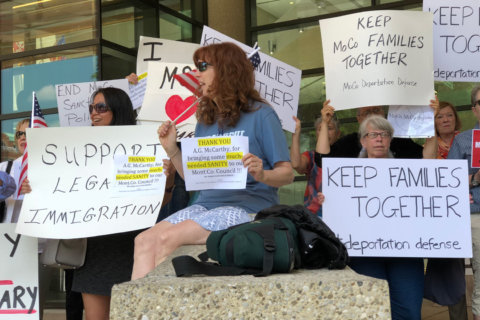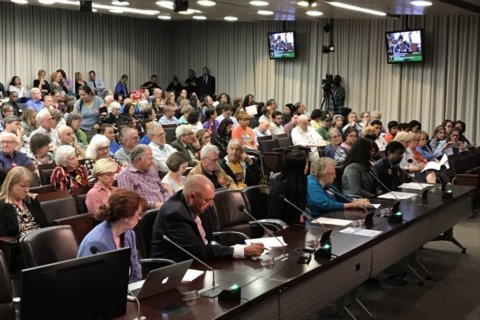ROCKVILLE, Md. — In a unanimous vote Tuesday, the Montgomery County Council passed a special appropriation that will create a legal fund for immigrants who live in the county and could face deportation.
The measure is different from the proposal first made in April. While it sets aside the same $370,000 in the 2019 budget to provide legal aid, anyone convicted of a long list of crimes would be excluded accessing the defense funds.
Originally, the council designed the funds to be used by the Capital Area Immigrant’s Rights Coalition (CAIR), but when the council added a detailed list of new exclusions in May, CAIR withdrew from the proposal.
Montgomery County Council President Hans Riemer said it was a carefully considered vote.
“We have to make tough choices in government. That’s what we do,” he said.
On Monday ahead of the vote, protesters came out to question the county’s decision to add dozens of crimes, which included traffic violations, to the list. They were joined by supporters of the county’s state’s attorney, John McCarthy, who helped add crimes to the list.
Councilmember Marc Elrich said it was hard to balance what he said should be the right of low-income residents to have representation in immigration court versus public safety.
“I still wish it could get resolved with a finer edge on it” Elrich said, referring to drawing the line on which crimes would prevent someone from getting access to the public money.
For Councilmember Sidney Katz, the decision was a simpler. While Katz said the council wanted to make sure that immigrants who lived in the county could get a fair shake in immigration court, he added: “This allows us to help the people that I think people want as their good neighbor, rather than someone that’s committed a horrible crime.”
Joanna Silver is with the Montgomery County Deportation Defense Coalition. She said she was frustrated by the change that created a list of criminal convictions that may exclude, according to CASA of Maryland, 75 percent of those facing deportation from getting assistance.
“What’s wrong with that is that it basically means that people who are eligible for getting relief under immigration law — despite having criminal convictions — will no longer get that relief,” Silver said, adding that under the original proposal, immigration court judges would still have had the ability to examine an immigrants’ criminal record and make a decision.
The vote left people on both sides of the issue dissatisfied. Supporters of funding the legal aid feel too many people are being cut off under the final version of the measure. At a news conference on Monday, opponents said they did not think any public money should be spent on those who came to the country illegally.








